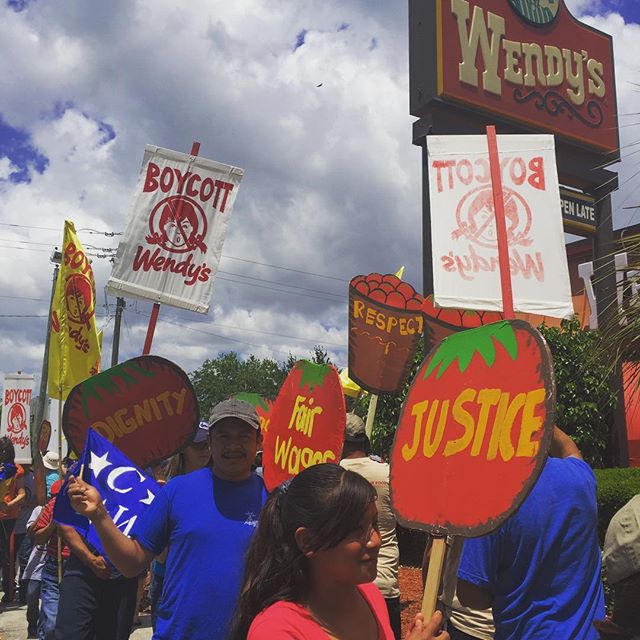

In March, a group of protesters gathered in front of Nelson Peltz’s home. Peltz is the chairman of Wendy’s, and the protesters represented the Coalition of Immokalee Farmworker’s (CIW). After months of protesting at Wendy’s locations across the country, this Saturday the protests will be brought to Jackson, Mississippi.
The coalition was formed in 1993 and has fought for better working conditions, against human trafficking and for fair wages among laborers. In 2011, the coalition designed the “Fair Food Program (FFP)” designed to better serve workers used by large corporations. The CIW’s description of the FFP can be seen below:
“The CIW’s Fair Food Program is a unique partnership among farmers, farmworkers, and retail food companies that ensures humane wages and working conditions for the workers who pick fruits and vegetables on participating farms. It harnesses the power of consumer demand to give farm workers a voice in the decisions that affect their lives, and to eliminate the longstanding abuses that have plagued agriculture for generations.”
Hailed by the New York Times as “the best workplace monitoring program in the U.S.’’ and President Bill Clinton calling it a “brilliant” program, the Fair Food Program has partnered with numerous corporations to implement their program. Among the corporations are McDonalds, Burger King, Wal-Mart, Subway and other major players in the fast food industry. According to the FFP’s website they have added $15 million to participating growers and workers by these companies agreeing to pay a slightly higher premium for the tomatoes harvested for use.
While many have implemented the program, Wendy’s resistance has brought on the protests from the organization.
In a statement, Nely Rodriguez of the CIW said:
“Wendy’s is quick to offer their Supplier Code of Conduct, released last year, as their substitute for the Fair Food Program – and their reason for not joining. But without any effective measures for enforcement or worker participation, Wendy’s code does not measure up to a commitment to the Fair Food Program. In the Program, retailers are bound to purchase tomatoes exclusively from growers that abide by a worker-designed code of conduct that includes zero tolerance for forced labor and sexual assault.”
Wendy’s has released an official statement on their reasoning behind not adopting the Fair Food Policy in the form of a blog post on their company website. While Wendy’s shares the belief that the CIW and the FFP exist to improve standards across the industry, they disagree on how to achieve that goal.
“We have always prided ourselves on our relationships with industry-leading suppliers who share our commitment to quality, integrity and ethics. We support the goals of any organization that seeks to improve human rights, but we don’t believe we should pay another company’s employees – just as we do not pay factory workers, truck drivers or maintenance personnel that work for our other suppliers.” The statement reads.In addition to the fees that the FFP demands, according to the statement, Wendys’ doesn’t purchase tomatoes from the region that the CIW operates in. Wendy’s receives large amounts of their tomatoes from Mexico, to which the CIW accused them of trying to do so to get around certain standards. A claim that Wendy’s
“In addition to the fees that the FFP demands, according to the statement, Wendys’ doesn’t purchase tomatoes from the region that the CIW operates in. Wendy’s receives large amounts of their tomatoes from Mexico, to which the CIW accused them of trying to do so to get around certain standards. A claim that Wendy’s refutes.
“For years, CIW has pressured companies into joining their program, assuring their members that large companies had no choice but to purchase tomatoes in Florida. This statement is no longer true. In recent years, the tomato industry in Mexico has invested tremendous energy into innovation in tomato cultivation, and has made dramatic improvements in fresh produce sorting, handling and distribution.”
The statement then goes on to explain that their standard is not jeopardized no matter where their tomatoes come from.
“All of our suppliers, including those in Mexico, are subject to the same quality and food safety standards, and we actively perform over 1,000 audits annually against those standards. We spend a LOT of time with our suppliers and their teams – on farms, in fields, in processing houses, and with distributors – it’s truly a farm to fork commitment for us.”
A protest that will include a march down Hill Street in Jackson this Saturday ending at the Hill Street Wendy’s location. Alex Borst of the Mississippi Sustainable Agriculture Network noted that the protests are to raise awareness and try to influence change and nothing else.
“We stay on the sidewalks at all times because it’s public property. The protests are all in good spirits; it’s nothing hateful,” Borst said.
He added that eventually, one worker will go in with a letter given to the manager on behalf of the CIW inhales they will in turn work with the corporate offices to decide to implement the FFP.
For the full Wendy’s statement, click here
For more about the Fair Food Program, click here
Steven Gagliano is a writer for HottyToddy.com. He can be reached at steven.gagliano@hottytoddy.com.
Follow HottyToddy.com on Instagram, Twitter and Snapchat @hottytoddynews. Like its Facebook page: If You Love Oxford and Ole Miss…

